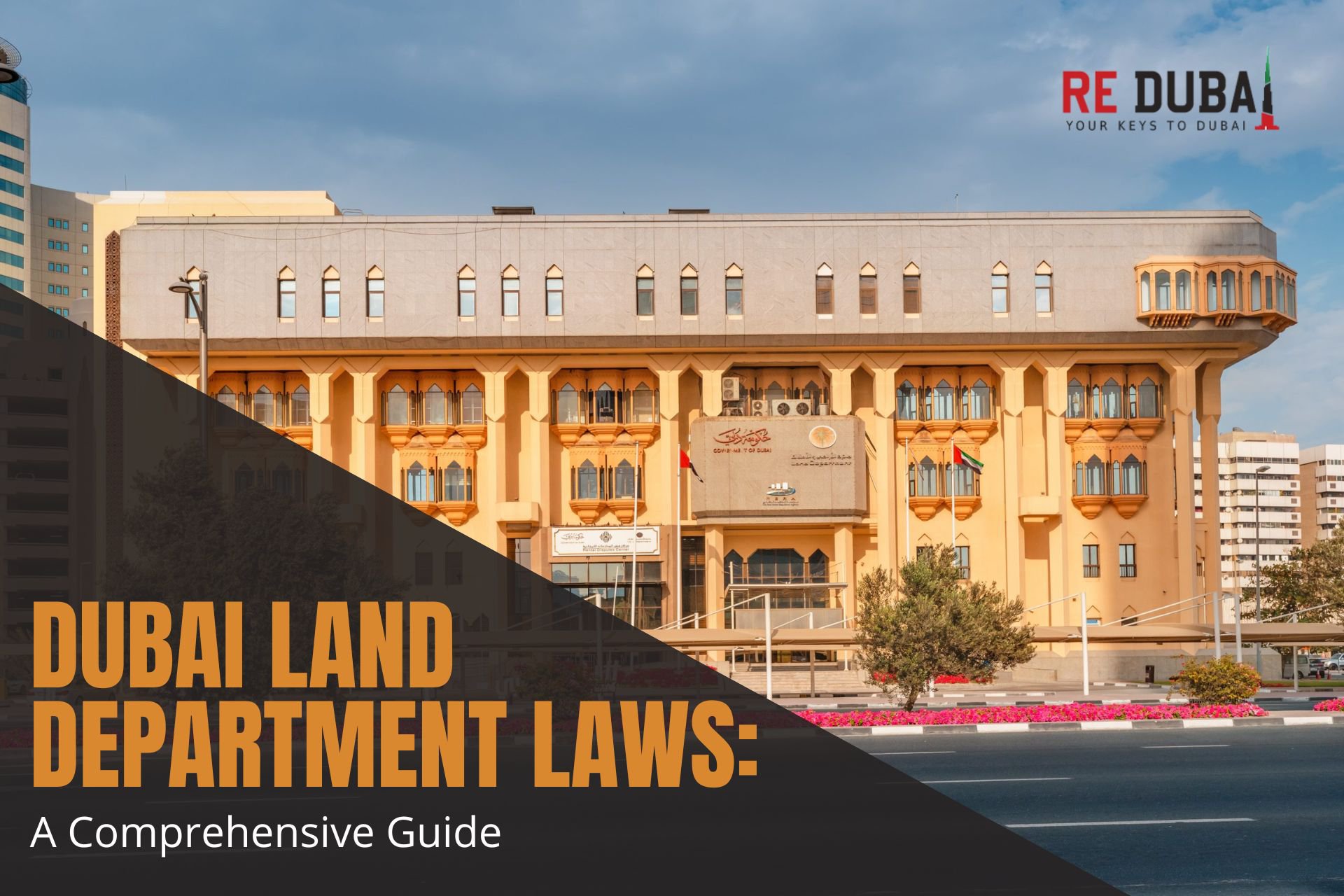Dubai's real estate market is renowned for its transparency and efficiency, governed by a robust framework of laws and regulations overseen by the Dubai Land Department (DLD). In this comprehensive guide, we delve deep into the intricacies of Dubai's real estate laws and regulations, offering readers an exhaustive understanding of how the sector functions under the vigilant eye of the DLD.
Overview of DLD Laws and Regulations:
Dubai's real estate laws and regulations are intricately crafted to protect the interests of all stakeholders involved in property transactions, ranging from buyers and sellers to landlords and tenants. These regulations serve several key purposes:
- Ensuring Fair Dealings: The DLD laws establish a level playing field, promoting fairness and ethical conduct across the real estate sector. This includes measures to prevent discrimination, uphold contractual agreements, and safeguard the rights of all parties involved.
- Combatting Fraud: Stringent regulations are implemented to detect, deter, and prosecute fraudulent activities within the real estate market. This encompasses measures to prevent property scams, misinformation, identity theft, and illegal transactions, enhancing overall market integrity.
- Fostering a Dynamic Market: DLD regulations play a crucial role in maintaining a robust and sustainable real estate market. By instilling investor confidence, attracting diverse investment sources, and supporting economic growth, these regulations contribute to the market's resilience and vitality over time.
In essence, the Dubai Land Department's laws and regulations serve as pillars of stability, transparency, and trustworthiness, ensuring a thriving and resilient real estate environment for all stakeholders.

Property Ownership Laws:
Dubai's property ownership laws are governed by federal and local regulations, defining eligibility for ownership and foreign ownership restrictions. Key aspects include:
- Eligibility for Ownership: Dubai's laws categorically define who is eligible to own property, including UAE nationals, GCC nationals, and specific categories of foreign investors.
- Foreign Ownership Restrictions: While Dubai extends foreign ownership privileges in designated zones, it imposes restrictions on the type of property foreigners can own and the geographic areas where ownership is permissible.
- Freehold Property Regulations: Freehold ownership grants full rights to the property and underlying land, with regulations outlining rights, obligations, property upkeep, utilization, and transferability.
Property ownership in Dubai encompasses three main types:
- Freehold Ownership: Allows indefinite ownership of both land and property.
Offers full control over usage, transfer, rental, and sale.
Subject to various fees and taxes, including transfer fees and DLD fees.
Despite costs, remains popular for its stability and long-term benefits.
Represents 46% of Dubai's projected property growth as of February 2023. - Leasehold Ownership: Grants the right to occupy a property for a specified period (25 to 99 years).
Increasingly favored due to Dubai's rapid development and luxury offerings.
Witnessed a significant rise in transactions over the past decade, especially among foreign buyers. - Commonhold Ownership: Involves shared ownership of property units and common areas/facilities.
Offers flexibility and affordability compared to freehold ownership.
Regulated by the Dubai Real Estate Regulatory Authority.
Accounts for about 20% of all property transactions in Dubai, with growing popularity and developer offerings.
Property Registration and Transfer Process in Dubai:
Registering property transactions with the Dubai Land Department (DLD) involves meticulous steps, ensuring transparency and efficiency in real estate dealings within the emirate. The process unfolds through the following stages:
Document Compilation and Verification
Parties involved in property transactions must compile requisite documents such as valid identification, title deeds, sale agreements, and No Objection Certificates (NOCs) from relevant authorities. This documentation is crucial for establishing the legal framework of the transaction.
Verification Protocol
The DLD undertakes a meticulous verification process to validate transaction particulars, ensuring strict compliance with legal prerequisites and verifying the authenticity of the transaction. This verification step helps prevent fraud and ensures the accuracy of property-related information.
Property Transfer Procedures
Transferring property ownership in Dubai involves additional steps beyond document compilation and verification. These steps include:
- Signing a Sale and Purchase Agreement: Buyers and sellers must enter into a legally binding sale and purchase agreement, outlining the terms and conditions of the transaction. This agreement serves as the foundation for the property transfer process.
- Obtaining NOC from the Developer: If the property being transferred is part of a development project, obtaining a No Objection Certificate (NOC) from the developer is necessary. This certificate confirms that the developer has no objection to the property transfer and ensures a smooth transition of ownership.
- Conducting a Property Title Search: A property title search is conducted to verify the ownership status, encumbrances, and any legal issues associated with the property. This search helps both parties understand the property's history and ensures a clear title transfer.
- Paying Transfer Fees: Transfer fees are calculated based on the property's value, typically ranging from 2% to 4%. These fees contribute to the cost of the property transfer process and are payable to the Dubai Land Department.
New Property Registration System (Dubai Land Department – DLD)
In 2019, the Dubai Land Department launched a new property registration system aimed at streamlining the transfer process and enhancing efficiency. The DLD's online platform allows easy access to property records, transfer procedures, and fee payments, facilitating a hassle-free experience for all parties involved.
Every year, the DLD records over 30,000 property transactions, highlighting the robustness of Dubai's real estate market and the continued demand for property ownership within the emirate. The DLD strives for excellence in its services, ensuring a transparent, fair, and efficient property transfer process that upholds the interests of buyers, sellers, landlords, and tenants alike.
Legal Compliance Guidelines:
Adherence to legal compliance guidelines is crucial to forestall legal entanglements and ensure operational smoothness. Guidelines include:
- Contractual Clarity: Ensuring absolute clarity and transparency in contractual stipulations to avoid disputes and misinterpretations.
- Due Diligence Imperative: Undertaking exhaustive due diligence, including property inspections, title searches, and legal assessments, to validate transaction legitimacy and mitigate risks.
- Regulatory Mandate Adherence: Strict adherence to DLD laws and regulations, encompassing registration prerequisites, fee remittances, and documentation standards for legal compliance.
Taxation and Fees Associated With Real Estate Transactions in Dubai
Real estate transactions in Dubai encompass various taxes and fees that are essential to understand for both buyers and sellers. The primary tax imposed is the Value Added Tax (VAT) at a rate of 5% of the property's sale price, impacting the overall cost of the transaction. Additionally, buyers are subject to a Transfer Fee, equivalent to 2% of the property value, payable upon completion of the purchase.
Furthermore, the Dubai Land Department imposes a registration fee of AED 4,000 for each transaction, essential for legal documentation and processing. For transactions involving mortgages, there is an additional mortgage registration fee equivalent to 0.25% of the mortgage amount.
It's important to note that foreign buyers may encounter additional fees such as the property sponsorship fee and the residency visa fee, depending on their circumstances and visa requirements.
Despite these fees, the real estate market in Dubai has demonstrated robust growth, evidenced by an 8% increase in sales transactions and a 5% rise in property values during the last quarter of 2022. This growth trajectory reflects the ongoing efforts of the Dubai government to attract foreign investment and foster economic prosperity in the emirate.
Government Oversight in Dubai Real Estate
Dubai's real estate market operates under the vigilant oversight of several key government agencies, each with distinct roles aimed at fostering a fair and prosperous environment for all stakeholders.
1. Dubai Land Department (DLD)
The DLD serves as the central authority responsible for registering and regulating real estate transactions. Its mandate includes setting and enforcing standards to promote integrity and trust within the real estate sector.
2. Dubai Real Estate Regulatory Authority (RERA)
RERA plays a crucial role in overseeing the development and advancement of the real estate industry. It ensures compliance with Dubai's real estate regulations, resolves disputes, and upholds the rights of buyers, sellers, landlords, and tenants.
3. Dubai Electricity and Water Authority (DEWA)
DEWA's responsibility lies in providing essential utilities such as electricity and water to residents and businesses across Dubai, contributing to the overall livability and functionality of the emirate.
Government Initiatives and Market Growth
Dubai's government has implemented various initiatives aimed at attracting investment and fostering growth in the real estate market. These efforts have yielded positive results, with the number of registered real estate transactions increasing by 6% in 2022, totaling 68,000 transactions valued at $143 billion.
Future Outlook and Investment Potential
The outlook for Dubai's property laws and regulations remains dynamic, evolving to maintain transparency and investor confidence. With a robust infrastructure, favorable tax policies, and a diverse economy, Dubai continues to attract global interest as a prime destination for real estate investment.

Navigating Dubai's intricate real estate laws and regulations demands a deep comprehension of the legal intricacies, procedural necessities, and adherence to compliance guidelines. By strictly following DLD regulations, transparency, fairness, and legal effectiveness are reinforced in real estate dealings, elevating investor trust and cultivating a resilient market environment. For valuable insights and expert guidance in maneuvering through Dubai's real estate terrain, seek assistance from established firms like Redubai. Redubai’s wealth of industry knowledge and expertise ensures that your real estate ventures in Dubai are backed by reliable support and tailored services. Explore Redubai today to access a plethora of resources customized to cater to your specific needs in the dynamic Dubai real estate sector.




